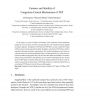Free Online Productivity Tools
i2Speak
i2Symbol
i2OCR
iTex2Img
iWeb2Print
iWeb2Shot
i2Type
iPdf2Split
iPdf2Merge
i2Bopomofo
i2Arabic
i2Style
i2Image
i2PDF
iLatex2Rtf
Sci2ools
INFOCOM
1999
IEEE
1999
IEEE
Fairness and Stability of Congestion Control Mechanisms of TCP
| Added | 03 Aug 2010 |
| Updated | 03 Aug 2010 |
| Type | Conference |
| Year | 1999 |
| Where | INFOCOM |
| Authors | Go Hasegawa, Masayuki Murata, Hideo Miyahara |
Comments (0)

